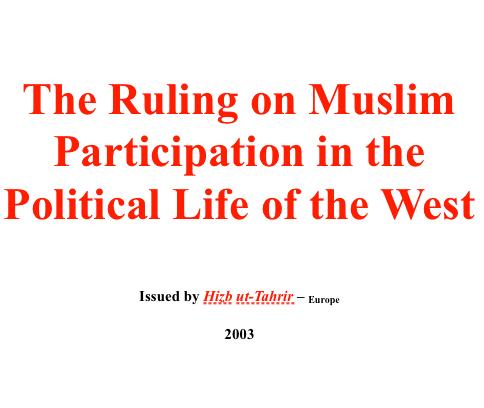
Download the book from here.
أَلَمْ تَرَ إِلَى الَّذِينَ يَزْعُمُونَ أَنَّهُمْ آمَنُواْ بِمَا أُنزِلَ إِلَيْكَ وَمَا أُنزِلَ مِن قَبْلِكَ يُرِيدُونَ أَن يَتَحَاكَمُواْ إِلَى الطَّاغُوتِ وَقَدْ أُمِرُواْ أَن يَكْفُرُواْ بِهِ وَيُرِيدُ الشَّيْطَانُ أَن يُضِلَّهُمْ ضَلاَلاً بَعِيدًا
"Have you seen those who claim that they believe in that which has been sent down to you, and that which has been sent down before you, and they wish to go for judgement (in their disputes) to the Taghut (false judges) while they have been ordered to reject them. But Shaytan wishes to lead them far astray." [4:60]
"Have you seen those who claim that they believe in that which has been sent down to you, and that which has been sent down before you, and they wish to go for judgement (in their disputes) to the Taghut (false judges) while they have been ordered to reject them. But Shaytan wishes to lead them far astray." [4:60]
In 2003 members of Hizb ut-Tahrir in Europe looked at the much discussed issue of the Muslim participation in the political life of the West, and issued a short booklet explaining the Islamic ruling on the issue - based upon Quran, Sunnah, Ijma' as-Sahabah and Qiyas.
Prior to this, some Muslims viewed the issue purely from the basis of their own material interests or those of the Muslim community at large.
Others looked at the issue from a ‘pseudo-Islamic' viewpoint - ‘pseudo-Islamic', because from the outset those thinkers looked, not from the perspective of Islam, but by assuming that engagement within the Western system was the only practical means for Muslims to engage in non-Muslim countries - just as others had previously assumed that political engagement in Muslim countries could only practically be done by engaging in the kufr systems that exist there. These Muslims were not necessarily insincere, but misguided. They usually accepted that secularism (the separation of deen from dunya) and that legislation by other than what Allah revealed were kufr. However, they argued pragmatically that the ‘procedural' elements of the secular democratic system - i.e. elections - were permissible, even if the ‘philosophical' elements were impermissible. Regardless of their intention, the result was a confused set of ideas that accept that the Western system is the accepted standard - and that an Islamic argument should be brought to explore how it could be used.
This approach fundamentally differs from an Islamic approach. Looking at the Islamic ruling on an issue requires that the issue be viewed objectively and dispassionately, before measuring it against the Islamic texts. The conclusion is then accepted as it is - whether it accords with ones desires or not - and any political strategy should then be proposed based upon what Islam obliges, and within the limits of what Islam permits.
Whilst the examples and details contained within this book are based on the systems that exist in continental Europe, there is much that can be learned by Muslims who live in other places where the systems might differ in some of the details.
The book concludes with some broad principles of how Muslims living in the West should develop their political activity:
1. Restricting ourselves to the Halal means alone
2. Not sacrificing the interests of the global Ummah for a local gain
3. Remaining united as a community rather than allowing ourselves to be divided
4. Looking to achieve a degree of self-reliance, so that Muslims are not beholden to others.
We pray that Muslims find a benefit in this work produced by our brothers and sisters in Europe - in particular at a time when the discussion in Britain is on-going.
No comments:
Post a Comment